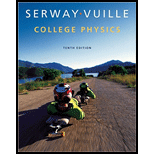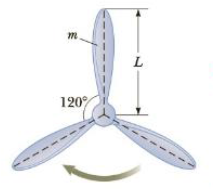
Concept explainers
Additional Problems
A typical propeller of a turbine used to generate electricity from the wind consists of three blades as in Figure P8.75. Each blade has a length of L = 35 in and a mass of m = 420 kg. The propeller rotates at the rate of 25 rev/min. (a) Convert the angular speed of the propeller to units of rad/s. Find (b) the moment of inertia of the propeller about the axis of rotation and (c) the total kinetic, energy of the propeller.

Figure P8.75
Want to see the full answer?
Check out a sample textbook solution
Chapter 8 Solutions
Bundle: College Physics, Loose-Leaf Version, 10th, + WebAssign Printed Access Card for Serway/Vuille's College Physics, 10th Edition, Multi-Term
Additional Science Textbook Solutions
Essential University Physics (3rd Edition)
Essential University Physics: Volume 1 (3rd Edition)
Lecture- Tutorials for Introductory Astronomy
Glencoe Physical Science 2012 Student Edition (Glencoe Science) (McGraw-Hill Education)
Conceptual Physics: The High School Physics Program
University Physics Volume 2
- A system consists of a disk of mass 2.0 kg and radius 50 cm upon which is mounted an annular cylinder of mass 1.0 kg with inner radius 20 cm and outer radius 30 cm (see below). The system rotates about an axis through the center of the disk and annular cylinder at 10 rev/s. (a) What is the moment of inertia of the system? (b) What is its rotational kinetic energy?arrow_forwardA cam of mass M is in the shape of a circular disk of diameter 2R with an off-center circular hole of diameter R is mounted on a uniform cylindrical shaft whose diameter matches that of the hole (Fig. P1 3.78). a. What is the rotational inertia of the cam and shaft around the axis of the shaft? b. What is the rotational kinetic energy of the cam and shaft if the system rotates with angular speed around this axis?arrow_forwardA system of point particles is shown in the following figure. Each particle has mass 0.3 kg and they all lie in the same place. (a) What is the moment of inertia of the system about the given axis? (b) If the system rotates at 5 rev/s, what is its rotational kinetic energy?arrow_forward
- A uniform cylindrical grindstion has a mass of 10 kg and a radius of 12 cm. (a) What is the rotational kinetic energy of the grindstone when it is rotating at 1.5103rev/min ? (b) After the grindstone’s motor is turned off, a knife blade is pressed against the outer edge coefficient of kinetic friction between the grindstone and the blade is 0.80. Use the work energy theorem to determine how many turns the grindstone makes before it stops.arrow_forwardA system of point particles is rotating about a fixed axis at 4 rev/s. The particles are fixed with respect to each other. The masses and distances to the axis of the point particles are m1=0.1kg , r1=0.2m , m2=0.05kg , r2=0.4m , m3=0.5kg , r3=0.01m . (a) What is the moment of inertia of the system? (b) What is the rotational kinetic energy of the system?arrow_forwardA disk with moment of inertia I1 rotates about a frictionless, vertical axle with angular speed i. A second disk, this one having moment of inertia I2 and initially not rotating, drops onto the first disk (Fig. P10.50). Because of friction between the surfaces, the two eventually reach the same angular speed f. (a) Calculate f. (b) Calculate the ratio of the final to the initial rotational energy. Figure P10.50arrow_forward
- Lara is running just outside the circumference of a carousel, looking for her favorite horse to ride, with a constant angular speed of 1.00 rad/s. Just as she spots the horse, one-fourth of the circumference ahead of her, the carousel begins to move, accelerating from rest at 0.050 rad/s2. a. Taking the time when the carousel begins to move as t = 0, when will Lara catch up to the horse? b. Lara mistakenly passes the horse and keeps running at constant angular speed. If the carousel continues to accelerate at the same rate, when will the horse draw even with Lara again?arrow_forwardA bug of mass 0.020 kg is at rest on the edge of a solid cylindrical disk (M=0.10kg,R=0.10m) rotating in a horizontal plane around the vertical axis through its center. The disk is rotating at 10.0 rad/s. The bug crawls to the center of the disk. (a) What is the new angular velocity of the disk? (b) What is the change in the kinetic energy of the system? (c) If the bug crawls back to the outer edge of the disk, what is the angular velocity of the disk then? (d) What is the new kinetic energy of the system? (e) What is the cause of the increase and decrease of kinetic energy?arrow_forward(a) What is the angular speed of the second hand of an analog clock? (b) What is the direction of as you view a clock hanging on a vertical wall? (c) What is the magnitude of the angular acceleration vector of the second hand?arrow_forward
- Integrated Concepts An ultracentrifuge accelerates from rest to 100,000 rpm in 2.00 min. (a) What is its angular acceleration in rad/s2? (b) What is the tangential acceleration of a point 9.50 cm from the axis of rotation? (c) What is the radial acceleration in m/s2 and multiples of g of this point at full rpm?arrow_forwardAs shown in Figure OQ10.7, a cord is wrapped onto a cylindrical reel mounted on a fixed, friction less, horizontal axle. When does the reel have a greater magnitude of angular acceleration? (a) When the cord is pulled down with a constant force of 50 N. (b) When an object of weight 50 X is hung from the cord and released, (c) The angular accelerations in parts (a) and (b) are equal, (d) It is impossible to determine.arrow_forwardA thin stick of mass 0.2 kg and length L=0.5m is attached to the rim of a metal disk of mass M=2.0kg and radius R=0.3m . The stick is free to rotate around a horizontal axis through its other end (see the following figure). (a) If the combinatin is related with the stick horizontal, what is the speed of the center of the disk when the stick is vertical? (b) What is the acceleration fo the center of the disk at the stick is released? (c) At the instant the stick passes through the vertical?arrow_forward
 College PhysicsPhysicsISBN:9781305952300Author:Raymond A. Serway, Chris VuillePublisher:Cengage Learning
College PhysicsPhysicsISBN:9781305952300Author:Raymond A. Serway, Chris VuillePublisher:Cengage Learning College PhysicsPhysicsISBN:9781285737027Author:Raymond A. Serway, Chris VuillePublisher:Cengage Learning
College PhysicsPhysicsISBN:9781285737027Author:Raymond A. Serway, Chris VuillePublisher:Cengage Learning University Physics Volume 1PhysicsISBN:9781938168277Author:William Moebs, Samuel J. Ling, Jeff SannyPublisher:OpenStax - Rice University
University Physics Volume 1PhysicsISBN:9781938168277Author:William Moebs, Samuel J. Ling, Jeff SannyPublisher:OpenStax - Rice University Principles of Physics: A Calculus-Based TextPhysicsISBN:9781133104261Author:Raymond A. Serway, John W. JewettPublisher:Cengage Learning
Principles of Physics: A Calculus-Based TextPhysicsISBN:9781133104261Author:Raymond A. Serway, John W. JewettPublisher:Cengage Learning Physics for Scientists and Engineers: Foundations...PhysicsISBN:9781133939146Author:Katz, Debora M.Publisher:Cengage Learning
Physics for Scientists and Engineers: Foundations...PhysicsISBN:9781133939146Author:Katz, Debora M.Publisher:Cengage Learning Physics for Scientists and Engineers, Technology ...PhysicsISBN:9781305116399Author:Raymond A. Serway, John W. JewettPublisher:Cengage Learning
Physics for Scientists and Engineers, Technology ...PhysicsISBN:9781305116399Author:Raymond A. Serway, John W. JewettPublisher:Cengage Learning





